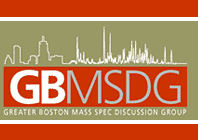GBMSDG Meeting Archives
April 2, 2009
Guest Speaker
Alan G. Marshall, Ph.D.
Director, Ion Cyclotron Resonance (ICR) Program
Robert O. Lawton Professor of Chemistry & Biochemistry
Florida State University
Reading Chemical "Fine Print":
The Key to Exploiting Nature's Isotopic Complexity
Location
Wyeth
Sponsored by
Wyeth
Special thanks to Wyeth for sponsoring and hosting this event. It is the active participation of our sponsors that allows us to keep the fees for membership, dinners, drinks, speakers, etc. so low.
Presentation Abstract
Most mass analysis relies on "nominal" mass accuracy (i.e., to within 1 Da). However, more and more applications are based on much more accurate mass measurement. Fourier transform ion cyclotron resonance mass spectrometry (FT-ICR MS) offers 10-100 times higher mass resolving power than other mass analyzers.
High mass resolving power (m/dm50% > 400,000) offers two major advantages. First, it becomes possible to separate complex mixtures without prior chromatographic or gel separation. Second, elemental composition may be determined from accurate (to <1 ppm) mass measurement alone for unknown molecules up to ~1,000 Da. Examples from environmental, petrochemical, analytical, and biological (especially proteomics & lipidomics) problems will be presented, including world records for mass resolution.
Supported by NSF (DMR-06-54118), NIH (GM-78359), and the State of Florida.
About Alan G. Marshall
Alan G. Marshall completed his B.A. degree with Honors in Chemistry at Northwestern U.in 1965, and his Ph.D. in Physical Chemistry from Stanford U. in 1970. He joined the Chemistry faculty at the University of British Columbia (Vancouver, Canada) in 1969. He moved to Ohio State University in 1980 as Professor of Chemistry and Biochemistry and Director of the Campus Chemical Instrument Center. In 1993, he moved to Florida State University, where he is Robert O. Lawton Professor of Chemistry and Biochemistry and Director of the Ion Cyclotron Resonance (ICR) Program, an NSF national user facility for mass spectrometry.
He co-invented and leads the continuing development of Fourier transform ICR mass spectrometry. His current reseach spans FT-ICR instrumentation development, fossil fuels and environmental analysis, and mapping the primary and higher-order structures of biological macromolecules and their complexes.
His major recognitions include: Fellow, American Physical Society; Fellow, American Association for the Advancement of Science; Fellow, Society for Applied Spectroscopy; three American Chemical Society national awards (Chemical Instrumentation, Field-Franklin Award, and Analytical Chemistry Award); two Spectroscopy Society of Pittsburgh Awards (Hasler Award and Spectroscopy Award); American Society for Mass Spectrometry Distinguished Contribution Award; International Society for Mass Spectrometry Thomson Medal; and Chemical Pioneer Award from American Institute of Chemists. He is a former President of the American Society for Mass Spectrometry, and serves on several editorial boards. He has published 4 books, 4 patents, and 474 refereed journal articles, and has presented almost 1,500 talks/posters at conferences, universities, government labs, and industry. His papers have been cited more than 16,000 times.
Event photos
Dr. Marshall

